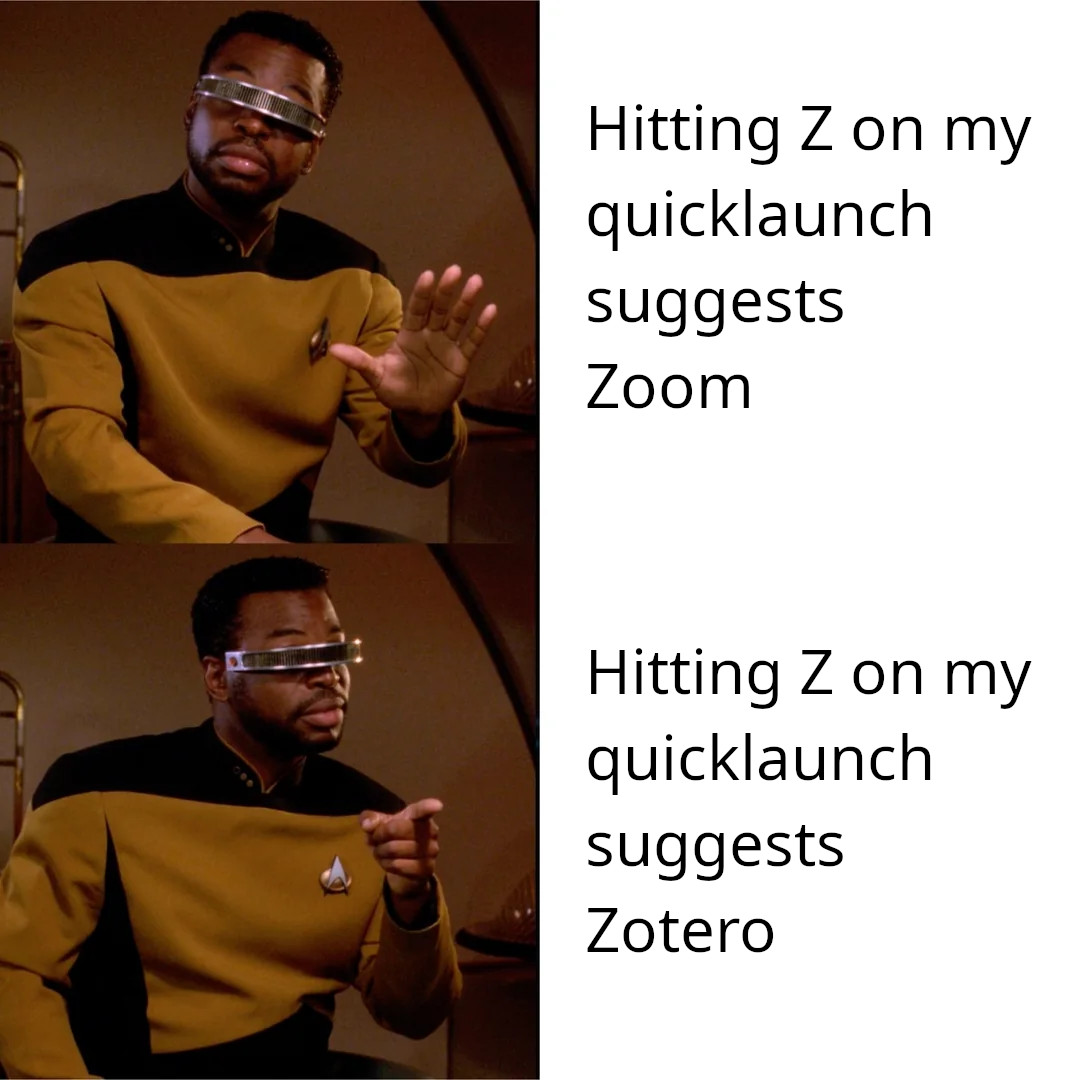What Does This Z Key Do?: Thoughts on Zotero versus Zettlr

Ever since I came across Gnome Do, a quick launcher application for Linux that brings up whatever files or applications I want if I simply start typing, I've used such launchers on every computer I've owned. Currently, since I use KDE, that means I use KRunner, which works similarly.
These launchers are designed to learn what applications or files I most often open, and they start to customize themselves. Over time this can reveal the ebbs and flows of my professional life.
I've really noticed this when I start to type the letter Z.
Sometimes, hitting Z suggests Zoom. That makes me quite sad, because it means I've been doing a lot of meetings on an application that is increasingly going down the generative AI hellhole -- including using Meta products. Meetings are often not the greatest thing in the world, but meeting where a corporation is listening to everything we say in order to make stupid assistants are the worst.
No, thank you.
Most of the time, however, there's a stiff competition for dominance of the Z key between an old favorite, Zotero, and an upstart system, Zettlr.
Here I walk through a project in which I started using Zettlr but ended up going back to Zotero. (Don't worry, Zettlr fans, I still use it. Just not as much as I thought I would.)
Compare and Contrast in 500 Words
It's not really fair to compare the two -- they do different jobs. Zotero is a bibliographic management system with SQLite backend. Zettlr works on a flat collection of Markdown files.
But the two do overlap in several key ways. Both allow for note-taking. Both use tags -- Zotero with a graphical interface, and Zettlr by way of octothorpes (that's this thing: #). Both enable declaring relations between items -- Zotero allows for marking a relation between citations (or notes, or combinations thereof) and Zettlr does it through tagging.
I have used Zotero for many, many years -- I've written several books with it. Besides using it to manage citations, I would take notes on specific citations and then link it all up with LibreOffice to draft documents.
Zettlr came on the scene for me as I started working on my latest book (please buy it!) -- it was useful for interview notes. It also became useful for what might be called "synthesis work" -- random thoughts about topics that might draw on multiple citations/sources, but not quite polished enough to make their way into LibreOffice.
Synthesis is not an area Zotero is useful for, in my view. As I've said before, it works better with notes tied to specific citations. Think of annotating a book or PDF. It's just not good for a multi-citation thought -- while it can store "standalone notes," I think they get lost in the system.
After a while, I found myself using Zettlr more and more -- not just for synthesis notes, but for taking notes on video chat meetings and even to-do lists.
Getting Pulled Back to Zotero
Given how useful Zettlr became as I finalized my last book, when I began a new project (which is a secret project! I won't tell you about it! yet...), I used Zettlr from the start. I fully intended to use it for all of the early stage of writing -- from note-taking through to synthesis.
I have been collecting sources on a topic -- hundreds of them. I would put them in Zotero, but I started taking notes on all of them in Zettlr. In my head, I had visions of being able to use Python to extract ideas or passages from the notes, and even do some basic statistical analysis.
Zettlr started to dominate the Z key in my quick launcher.
I think that was a mistake.
Instead of a neat collection of notes, things got messy -- fast. It became harder and harder to think about sources. What was that source I read a few days ago? I would wonder. Which person said what about this topic?
And tagging is not very satisfying in Zettlr. Zettlr's #octothorpe tagging requires multiword tags to be allOneWord. I do try to use camelCase for such tags, but Zettlr auto-corrects them to bealllowercase (as you can see, that's hard to read.)
Plus, jumping from tagged document to tagged document is a bit clunky. And since I do a lot of my thinking through tags, this became an even bigger problem.
I tried to mitigate this by putting all the notes on the sources in one long document, using headers. But once I got to about 30K words, the document became very slow. (I'm on an older computer, but still... it's just text!)
About halfway through my reading of the sources I had collected, I gave up on Zettlr and went back to Zotero. Once again it proved its worth for taking notes on specific citations. It remains quite fast, and sorting notes/citations by tag is a breeze. Plus the tags are readable -- they're not just one word.
As I proceeded, I would still go back to Zettlr to write notes about broader topics, but over time, Zotero won back the Z key in my quick launcher.
Using Them Both
This experience reminded me of the power of Zotero. Nothing beats it for citation management and note-taking. Zettlr is going to remain my middle-of-the-project system for synthesizing ideas. As I write up documents, however, things will shift to LibreOffice with the Zotero plugin. (While Zettlr allows for Zotero citations, I find it awkward.)

Comments
For each of these posts, I will also post to Mastodon. If you have a fediverse account and reply to my Mastodon post, that shows up as a comment on this blog unless you change your privacy settings to followers-only or DM. Content warnings will work. You can delete your comment by deleting it through Mastodon.
Don't have a fediverse account and you want one? Ask me how! robertwgehl AT protonmail . com
Reply through Fediverse